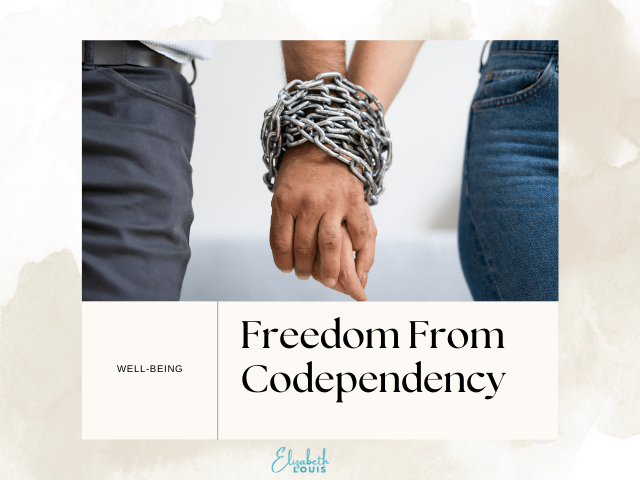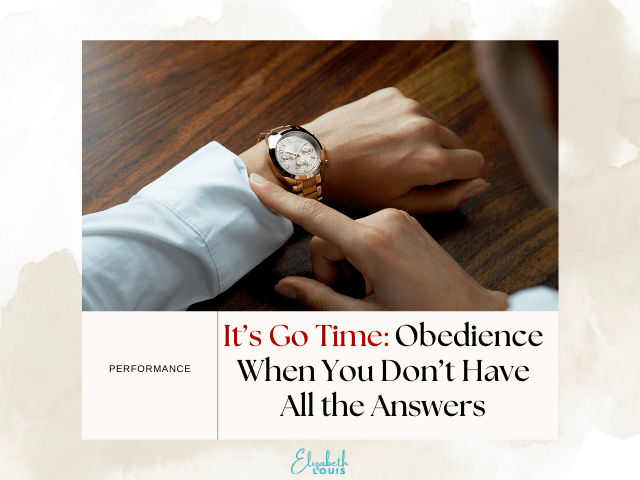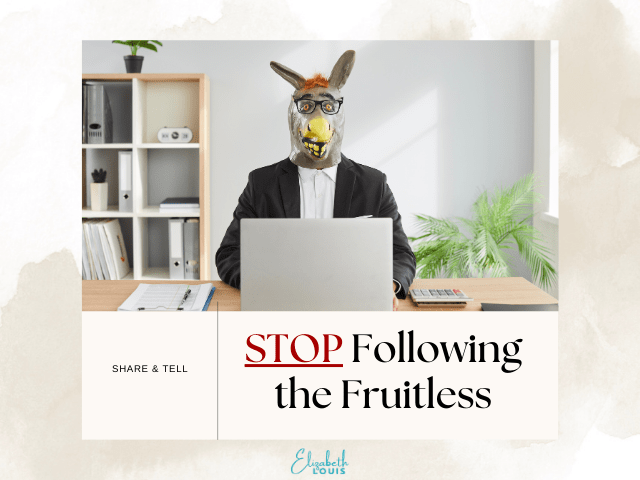
By: Elizabeth Louis
My childhood died at age 7 when my dad died.
Everything changed after his death. My home life went from peaceful and easygoing to living on eggshells. I went from living carefree in the present moment to being fearful and living in the past or the future.
Things only got worse as the days, months, and years went by after my dad’s death. More families died, and soon abuse and neglect became my norm.
I genuinely believe my mom did her absolute best in raising my brother and myself. Unfortunately, my brother was an unruly child who required an alpha male to keep him in line. Since my dad died and there was no one to help my mom with the single-parent duties, he ruled us with fear.
To say he was difficult to raise would be a tremendous understatement. In time, it got harder and harder for me to discern what was sibling rivalry and what was sibling abuse.
I had no refugee. I had to take matters into my hands, but I was weaker than him.
He is two years older than me and much stronger than I am. I learned to accept it and eventually believed his abusive opinion of me was my truth. I couldn’t talk about what my brother was doing to me to my mom because she was stressed out trying to keep him out of jail — an unachieved goal.
I say all this to say that my childhood instilled in me codependency.
I learned how to detach and dissociate from my emotions to be and do what pleased my mom or brother. I learned how to shift my attention to being there for my mom and helping her deal with her emotions so I wouldn’t have to deal with my own.
Being overly attached to others is a tell-tale sign of codependency.
My mom needed a therapist who provided her with an empathetic ear and unconditional love. I was eager to play that role. As someone with a huge heart, who hated seeing people in pain, I was delighted to take the job.
I witnessed how much pain she was in, and I despised it. I didn’t believe she deserved to have two awful children because, in my view, my mother was incredible, and I only wished for her to be happy and proud of at least one of her children. I wanted to do everything in my power to ease her suffering. Naturally, as a child, I never considered that I might be unable to do so.
Nonetheless, in hopes of removing my mom’s suffering, I hid behind a perfectionistic fixed mindset to help me cope with the shame and rejection that came from being victimized. Unconsciously I thought,
If I behave and carry myself as the perfect child, my mom will have more joy and peace. She will feel good and not be in the pain and stress I constantly see her in. I will make her happy.
And that’s what I set out to do.
Of course, as a child, I had no idea how unattainable or unhealthy that desire was. My bar was high and unachievable. I either passed or failed; I was either perfect or a failure.
Here is one example of how codependency blossoms in families.
Codependency can manifest when a person is exposed to prolonged periods of extreme stress. That stress leads individuals to unhealthy coping and defense mechanisms. When a family or individual discourages open communication, they significantly increase the likelihood of creating codependency.
I do not struggle with codependency today as I did as a child and young adult. I have done the work, renewed my mind, and upgraded my identity not to carry such coping mechanisms. I say this to give you hope that you, too, can leave codependency in the past.
In this blog, I am going to unpack:
- What is codependency?
- What causes codependency?
- How does codependency manifest?
- Why does codependency happen?
- When to do something about codependency.
- Tips for Overcoming Codependency
- An action plan
- Suggested Reading
I have also added the skills one can work on throughout this post to upgrade their identity (perspective, mindset, and language), cutting off this core belief and bad habit of being.
__________________________________________________________________________________________________
As a mental health practitioner for the last seven years, I have learned that most people struggle with codependency. Consider seeing codependency as a spectrum.
I hope this blog will be clear and decisive, helping you to begin chipping away at your codependency.
What Exactly is Codependency?
Ironically, there is no one-size-fits-all definition that the psychology world agrees on regarding codependency. In short, “codependency” is a misnomer for what it is and consists of.
Codependency first came to the table when addiction therapists noticed their clients had a dependency on alcohol. However, codependency expands much further than being dependent on a substance.
What is Codependency:
- It is a result of a stress-induced pattern of behavior that controls how a person treats another and how he/she allows that other person to influence him/her
- A fear-based reaction to stress where a person becomes consumed with another individual and loses sight of their individualism
- A dysfunctional relationship where an individual is psychologically and emotionally dependent on or controlled by a person with an addiction or by a substance
What Causes Codependency?
As mentioned above, codependency is created when a family or individual discourages open communication. The chronic stress of living in a world where one must constantly take the defense can cause an individual to dissociate and disconnect from his or her emotional needs and desires to survive.
The individual then shifts from being his or her authentic self to being controlled by the expectations and behaviors of those he or she lives with. Instead of learning how to control his or her emotions, the individual unconsciously begins to do or not do things that increase the chances of pleasing the individual they fear.
For instance, in my situation, I learned how to dissociate, be emotionally cut off and stoic and assume what my mom or brother wanted me to be or do to make her or him happy. Their emotions and actions controlled me and how I felt. Another example would be if a child had an abusive alcoholic parent. The child would learn not to upset the parent in order not to get hurt.
In short, one believes that one has control over another person’s emotions. The codependent’s thinking can be entirely product minded, like:
“If I act or behave this way, perhaps my parent/sibling/partner will feel better and not get angry/upset with me (for no reason).”
Please remember that children do not understand that they cannot control another person’s emotions. Even as adults, we forget this truth too. It is the responsibility of each individual to manage their own emotions. Sure, we can influence one another to get upset or angry, but we cannot control how another person will react. One has to take responsibility where responsibility lies.
How Does Codependency Manifest?
1). At a high level, codependents place responsibility in the wrong place. They see it’s their fault for why someone is upset or their responsibility to fix it.
For instance, it’s common for a codependent to believe he or she is responsible for everyone else, yet he or she does not take responsibility for him or herself. Again, this codependent core belief that stems from the fixed mindset of perfectionism leads the individual to believe he or she has to control everything.
The belief system or language they may use would sound like this:
- I have to do everything myself.
- No one helps me.
- Everything is my fault.
- I suck. I am a piece of crap.
Please note the elements of victimization in their thinking. Many times this victimization is unresolved and unprocessed trauma. At one point in the codependent’s life, he or she probably was a victim, but that doesn’t mean they have to continue being one.
Let’s challenge this core belief that a codependent is responsible for everyone.
- No one has control of everything. The only thing one has control over is him or herself. Another person’s reaction is another person’s reaction.
- Low self-esteem (self-efficacy and self-worth) is why one cannot take responsibility for himself or herself. The coping mechanism here is avoidance at its finest. If the codependent can focus on the other person, he or she won’t have to face reality and confront his or her low self-esteem. Since many people with low self-esteem tie their self-worth to their actions, admitting he or she made a mistake can exacerbate the codependent’s self-worth.
Skills to learn to take responsibility and improve self-worth:
- Radical Acceptance: means being open to your own thoughts, feelings, sensations, and circumstances as they are without trying to control them to be more ideal for you. To practice acceptance, you must connect with yourself emotionally. You can ask yourself the following question and mindfully observe what comes up. What emotion am I feeling? The 6 primary emotions are Fear, Anger, Surprise, Happy, Disgust, & Sadness.
- Mindfulness: means intentionally paying attention on purpose without judgment. I tell my clients to imagine being a fly on their own mental wall. Kindly observe your thoughts, feelings, sensations, and so forth with curiosity. Choose to be curious and investigate with an open-minded perspective. Next, ask yourself, What makes me want to avoid this feeling? What’s another perspective I can have about this emotion to welcome it?
- Detach your self-worth from your achievements and choose to accept that you are 100% worthy regardless of what you do or don’t do. It’s a decision that must become a belief through exposing yourself to this mantra: I am 100% worthy regardless of what I do. To take it a step further and have lasting results, root your self-worth into the love of the Divine, who says you are loved, cherished, and chosen.
2). Codependents do not know how to love themselves. In most cases, a codependent has never been given unconditional love. They do not know what it is like to be cherished, loved, looked after, or taken care of.
Since they are clueless about what it’s like to concentrate on themselves healthily, they neglect themselves. When deciding to focus on their own emotional regulation and needs or that of another person, they will always choose in favor of another’s need.
When you spend your entire life ignoring and neglecting yourself, it’s no surprise that you continue to do so.
The bottom line is that codependents have learned to hyperfocus on others to the point where they struggle to care for themselves or accept help.
When you consider this reality, it’s not surprising. If nobody has ever taught you how to attend to your needs and accept help, it’s not shocking that you wouldn’t know how to do it or that it would highlight your inadequacies.
Skills to improve your relationship with yourself:
- One of the best questions a codependent can begin to ask him or herself in moments where he or she is being drawn to take care of someone else and ignore his or her needs is: What do I want or need at this moment?
- Start to detach from others by focusing on yourself more. I encourage my clients to date themselves. That’s right! Write a list of things or hobbies you would like to do and do it alone. It’s time to learn yourself. For instance, go to a movie by yourself. Try the latest exercise class. Take yourself out to dinner.
- Part of breaking the codependent cycle is learning who you authentically are. Do your best to think about who you were before changing yourself and wearing masks to protect yourself. Once you have an idea, write down the characteristics. For instance, I was bold, fearless, curious, loving, and outspoken as a child. I loved being outside, doing sports, and entertaining my parent’s and their friends.
Why Codependency Develops?
Again, codependency is a coping mechanism. Such a mechanism helps one learn how to survive, which is a primal instinct.
When constantly exposed to stress and inconsistent behavior, it’s normal to feel like they live on eggshells. Such reality is emotionally, mentally, and spiritually exhausting.
Since codependency usually develops in childhood, you must remember that a human’s brain develops back to front. The executive functioning system of the prefrontal cortex allows one to make effective top-down decisions instead of bottom-up decisions. When you live in chronic fear, you are making a more bottom-up decision. Meaning you are allowing your body to dictate your choices.
The limbic system (back of the brain) is one of the first parts of the human brain to develop, and its main job is to code stimuli as safe or unsafe. That coding will elicit you to respond in healthy or unhealthy ways, but rarely of your own volition.
When you live in a stressful situation or receive malicious behavior from a person, your brain will often code the stimuli and environment as unsafe.
Since the human brain thinks more in associations than anything else, your mind will quickly create a connection between your situation and your stress. Neurons that wire together fire together.
The next time you are in a stressful situation or your limbic system senses similarities in the environment where you once experienced a stressful situation; you will feel stressed, thus strengthening the neurons and synaptic connections.
It’s destructive to live in fear.
As codependency typically develops in childhood, it is important to recognize that the child is growing up in a psychologically unsafe and fear-based environment. In healthy relationships, one should not be afraid to speak freely. Fear of being oneself is no way to live, nor is being too scared to openly share, which is a sign of an unhealthy relationship.
Of course, both children and adults may be insensitive at times. When you stop to think about it, humans are constantly hurting one another. However, parents must remember to use moments when children display inappropriate behavior as teachable moments rather than opportunities for overly harsh and unstable discipline.
As a trained therapist and executive performance coach, I have learned that most parents give conditional or performance love when it’s best to learn how to give unconditional love. That means you cannot retract your love when your child fails to meet your needs. A parent must learn how to give unconditional love and discipline.
Likewise, codependency can be developed at any age. For instance, addicts are codependent on their substance. When I was dying from anorexia bulimia, I was codependent on not eating or purging if I did eat.
I want to highlight this blog focuses more on when codependency is created from a stressful childhood.
When To Do Something About Your Codependence?
As soon as possible! Codependence is a destructive behaviorism that will oppress your quality of life. Believe it or not, it’s fueled by selfishness!
Tips for Overcoming Codependency
1). Practice Self-Care
First off, self-care is not the “I” centric bull sh*t that most people shout. Self-care is living a responsible life by being mindful of your spiritual, physical, and psychological needs. You have to put the airplane mask on yourself if you are going to save anyone else.
The best way to start to practice this is consistently asking yourself, What do I need or want at this moment? Consider using your values to learn how to make effective decisions and not impulsive ones.
2). Practice Detaching from Others
Detachment means taking responsibility for yourself and allowing others to do the same. In short, it’s remembering there is an imaginary line between you and them. You only have power in your territory, and your territory is you – your thoughts, emotions, behaviors, choices, and so forth. You can never cross that line because you are powerless in their territory.
One thing I tell myself when someone is upset with me when I have done nothing to warrant the malice behavior is it’s their problem, not mine. If someone is upset with me and I haven’t done anything to warrant a negative response, I remember that it’s their issue and they are an adult and can figure it out themselves.
Sometimes people learn that they can use intimidation, aggression, and hostility to manipulate you into doing what they want you to do. But you don’t have to bite their fruit when they do that.
It may sound heartless, but it is true. Now if someone wants to calmly with emotional regulation, share with me what hurt them; wonderful. But, I will not be someone’s scapegoat or punching bag.
3). Learn to say “NO”
Sometimes codependents think saying “no,” means they are a terrible person or will hurt the other person’s feelings. Again, you are not their God, nor do you have any control over how another person will react.
Start practicing saying no. Normalize it until it becomes second nature.
4). Nurture Your Self-Esteem
Since codependents struggle with low self-esteem and self-worth, it’s important to do the work to fix that. I encourage you to work with an executive coach or a trained therapist. Consider scheduling a complimentary session with me or someone on my team. Click Here to Schedule.
It can take some time to rebuild your self-efficacy and confidence. However, here are some tips that will start the journey now:
- Get off social media
- Break the limbic loop by reminding yourself that you are SAFE anytime you feel your body responding to a stressful situation. The brain and mind need to be rewired. Reminding yourself you are safe and are no longer that helpless child anymore can be helpful.
- Stop asking people for their opinions
- Connect with your own thoughts and feelings:
- How do I feel about this situation?
- Do I really care if this person is mad at me?
- What do I really want or need?
- What does unconditionally loving and accepting myself look like?
- Ground yourself in your faith. Humans are wired for a spiritual relationship with the Divine. It may sound cliche, but the answer to your problems are found in that relationship with the Divine.
5). Label The Codependency When It Shows Up
One of the most powerful things you can do is label the codependent mindset when it shows up.
In my coaching practice, I teach my clients to see negative, toxic, fixed, and fear-based mindsets as gremlins. Doing such allows you to externalize the internal voices and see it not as a part of you but as something invading your space that you need to make war on.
Now, the more granular you are in labeling, the easier it will be to shift into acceptance and successfully let the fixed mindset go. Here’s an example.
While I no longer struggle with codependency, I have moments where the codependent gremlin tries to take me captive again. For instance, I used to worry that my boyfriend would get mad at me if I didn’t rush over to him after work. Now, he’s never asked me to rush over to him ever. I was transferring fears from a previous relationship onto him and projecting my codependency onto him. Here’s what I do:
Codependent Gremlin Thought: Ugh, he will get mad that I’m not at his place yet. (Assumed expectation)
My Conscious Thought to Myself: Hmm…I know this sensation and feeling is linked to the codependent gremlin.
My Conscious Response to Gremlin: If he gets mad at me, that’s his problem. I never agreed to be at his place at a certain time. He ensures all his work gets done, and I will do the same for my job. I value my work, and he values his work. Plus, he’s extremely understanding and has never gotten mad at me for attending to my professional duties.
Suggested Reading
Codependent No More – Please note this is an affiliate link to Amazon. Therefore, I do get a portion of the proceeds.
The Liz Show, Podcast – Freedom from Codependency



